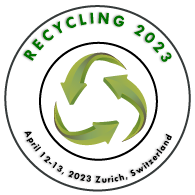The Bioplastics
Bioplastics are plastics produced using renewable biomass materials, including recovered food waste, maize starch, straw, woodchips, and vegetable fats and oils. Some bioplastics are made chemically from sugar derivatives (like lactic acid) and lipids (oils and fats) from plants and animals, while others are made biologically from sugar or lipid fermentation. Natural biopolymers used in the production of some bioplastics include polysaccharides (like starch, cellulose, chitosan, and alginate) and proteins (like soy protein, gluten, and gelatine). On the other hand, common plastics like fossil-fuel plastics (sometimes called petro-based polymers) are created using natural gas or petroleum. In 2014, bioplastics made up around 0.2% of the global polymer market. (300,000,000 tonnes). Even though bioplastics are not economically viable,
Related Conference of The Bioplastics
The Bioplastics Conference Speakers
Recommended Sessions
- Bioremediation
- Challenges in Plastic Waste Collection and Segregation
- Cylindrical Plastic for Packaging
- E-Waste
- Electric Vehicle (Ev) Batteries Circular Economy
- Innovation & Technology in Plastics Recycling
- Management and Recycling of Waste
- Physical & Chemical advanced Recycling
- Plastics Recycling Opportunities and Challenges
- Recovery of Thermal Waste
- Recycling Chemical Waste
- Recycling Industrial
- Recycling of Food and Agricultural Waste
- Recycling of Metal
- Recycling of Paper
- Solid Waste Management
- Start-up Showcase,
- The Bio-Electrochemical Treatment System is on
- The Bioplastics
- Treatment of Waste Water

